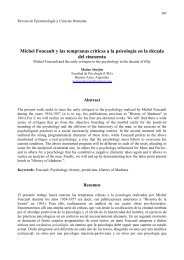3. Diego beltran quinto numero.pdf - Revista de Epistemología y ...
3. Diego beltran quinto numero.pdf - Revista de Epistemología y ...
3. Diego beltran quinto numero.pdf - Revista de Epistemología y ...
Create successful ePaper yourself
Turn your PDF publications into a flip-book with our unique Google optimized e-Paper software.
<strong>Revista</strong> <strong>de</strong> <strong>Epistemología</strong> y Ciencias Humanas<br />
political body implicit in the i<strong>de</strong>a of nation? It seems like illustrious <strong>de</strong>ad, their spectrum,<br />
have a power, an influence and permanence no present in the i<strong>de</strong>ological-immaterial (in a<br />
certain way trans-i<strong>de</strong>ological) body of the nation, in another words, in the political body.<br />
With respect to this, a comparison between our national political body and those of England<br />
and France will be achieved taking into consi<strong>de</strong>ration a classical literary work -The King’s<br />
Two Bodies by Ernst H. Kantorowicz- based upon a judicial-political fiction of the English<br />
and French monarchies during the XV and XVI centuries. The political theology analyzed by<br />
the author is centered on the issues of the passage of power and the political majesty and the<br />
work provi<strong>de</strong>s a sort of counterpoint of similar phenomena to the Argentine case where a<br />
kind of “inversion” in the conditions of the passage of power can be observed.<br />
Key words: geminated body – political majesty – <strong>de</strong>secration – political instability.<br />
1. Introducción<br />
Parece muy extraña la relación <strong>de</strong> la historia argentina con los cuerpos <strong>de</strong> sus lí<strong>de</strong>res o<br />
dirigentes una vez fallecidos. La veneración y el odio profesados en la vida <strong>de</strong> los mismos se<br />
prolonga en sus restos, como si los mismos aún poseyesen en plus <strong>de</strong> existencia o un hálito<br />
<strong>de</strong> vida política <strong>de</strong>l lí<strong>de</strong>r ya inexistente [1]. La repatriación <strong>de</strong> los restos <strong>de</strong> Rosas, los<br />
proyectos para realizarla, generan una fuerte polémica a lo largo <strong>de</strong> 55 años. El cuerpo<br />
embalsamado <strong>de</strong> Eva Duarte <strong>de</strong> Perón protagoniza una historia sórdida <strong>de</strong> viajes entre<br />
Buenos Aires y Europa en la que se suce<strong>de</strong>n ocultamientos <strong>de</strong>l cuerpo bajo nombre falso,<br />
hechos <strong>de</strong> necrofilia, brujería y agresiones y <strong>de</strong>terioro <strong>de</strong>l mismo. Uno <strong>de</strong> los episodios más<br />
notables al respecto lo constituye el transporte <strong>de</strong>l cuerpo <strong>de</strong>l general Lavalle a lo largo <strong>de</strong><br />
400 kilómetros <strong>de</strong>s<strong>de</strong> Jujuy hasta Bolivia, para impedir que sus enemigos lo profanaran; el<br />
calor <strong>de</strong>l <strong>de</strong>sierto obligó a <strong>de</strong>scarnar el cadáver.<br />
La historia <strong>de</strong> los restos <strong>de</strong> lí<strong>de</strong>res o figuras relevantes nacionales es una historia <strong>de</strong> odios y<br />
profanaciones. La pregunta que <strong>de</strong>bemos hacernos al respecto es: ¿qué relación guardan<br />
estos cuerpos profanados y reverenciados con el cuerpo político <strong>de</strong> la nación argentina, es<br />
<strong>de</strong>cir, con la imagen <strong>de</strong> cuerpo político implícito en la i<strong>de</strong>a <strong>de</strong> nación? La profecía <strong>de</strong> José<br />
116<br />
116




